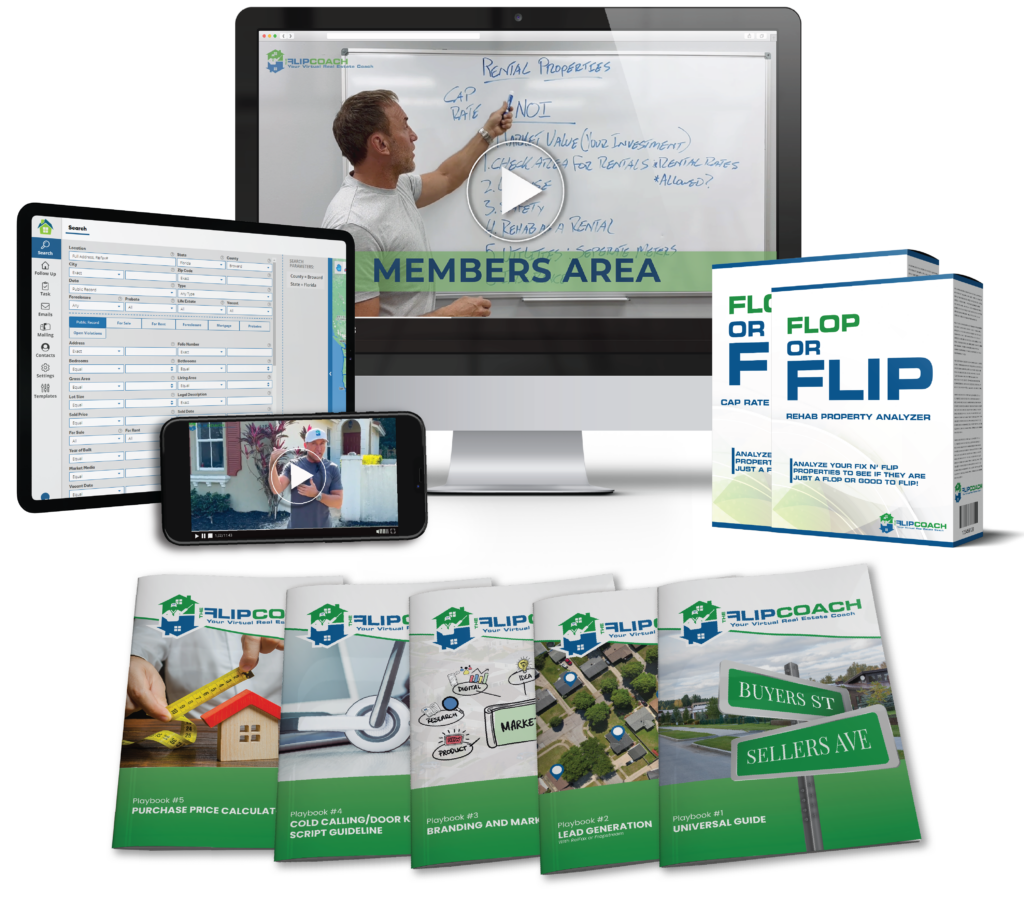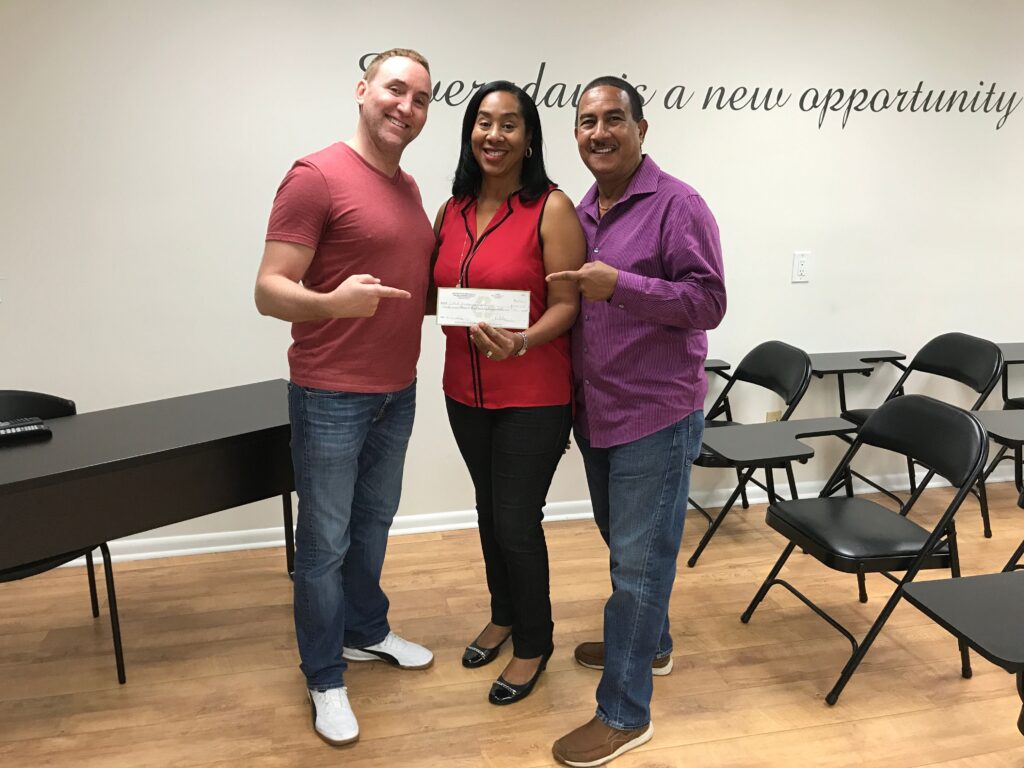Real Estate Mentoring (Local and National Options)
Searching for a real estate mentor? You've come to the right place!
Your choice in who you select to mentor your journey in real estate can make or break your success in the industry. Today I'll discuss what it takes to find an exceptional mentor—someone with the right expertise, teaching style, and commitment to your growth. Learn how to spot the mentor who will not just enlighten your path but also walk beside you as you climb the ladder of real estate success.
I'm Ryan Kuhlman, founder of Flip Coach, a national mentoring program helping real estate investors achieve their dreams. I also lead a local South Florida program that is more intense. If you are looking to sign up for either, book a call below and we'll explain how this works.

I've used my 30+ years of real estate investing to create a program to mentor people looking to learn the business.
Why You Need a Real Estate Investing Mentor
- A great real estate mentor is key to success, helping newcomers navigate the industry, avoid pitfalls, and fostering the next generation of skilled real estate professionals.
- The ideal mentor should possess expertise in the mentee’s real estate niche, a commitment to professional development, and a compatible communication style and availability for an effective mentor-mentee relationship.
- To find the right mentor, engage in networking, evaluate both free and paid mentorship options, and ensure to maximize mentorship sessions with preparedness and strategic planning for personal and professional growth.
How Real Estate Investing Mentoring Can Elevate Your Earnings

I put up all the money for my students and we SHARE the profits.
A good real estate mentor is like a lighthouse, guiding mentees through the choppy waters of the real estate investing industry, helping them navigate challenges and avoid common mistakes that often cause 80% of new agents to quit within the first year. Such personalized guidance can significantly impact your success in this competitive field. That’s why finding the best real estate mentor, or a real estate coach, is crucial. Real estate investing mentors serve as a sounding board, offering valuable insights through informed advice, moral support in tough times, and reinforcing learning from real-world experiences without spoon-feeding you everything.
The mentorship process is not just about the mentee’s development. It also has a profound impact on the real estate industry itself. It prepares the next generation of professionals, while mentors enhance their own leadership abilities, patience, and attentiveness. This fosters a culture of highest professional standards within the industry. Thus, investing in a mentorship relationship can sow seeds for a thriving future in real estate for both mentor and mentee.
Identifying Your Ideal Real Estate Mentor

What's stopping you from becoming a real estate investor?
Finding the right mentor is like finding the right pair of shoes. It should be a perfect fit, comfortable, and suitable for your journey. The right real estate mentor should:
- Align with your goals
- Have a teaching style that works for you
- Have a track record of success in the specific area of real estate investing you’re interested in
You’re not just looking for a mentor; you’re looking for your mentor.
Here are some key factors to consider in your search.
Compatibility with Your Real Estate Niche
Your mentor should be someone who’s walked in the shoes you want to fill. They should have relevant experience in the specific area of real estate investing you’re interested in. Such expertise is essential for receiving appropriate guidance. Imagine trying to learn how to climb mountains from a scuba diver. No matter how experienced the diver is, their expertise wouldn’t be much help on a mountain.
The world of real estate has various subtypes, including the real estate business, which can be further divided into:
- Residential real estate investment
- Commercial real estate investment
- Real estate development
- Property management
- Real estate brokerage
In addition, local real estate investors play a crucial role in the growth and development of these subtypes.
Each of these subtypes requires a mentor with relevant experience to provide tailored advice and guidance. So whether you want to dive into real estate development or explore other niches, your mentor should be someone who knows the terrain and can guide you through it.
Commitment to Professional Development
A mentor’s commitment to professional development is like the headlights on a car. Their commitment to learning enables them to:
- Keep up with industry trends, regulations, and market conditions, thus illuminating the path ahead.
- Share this knowledge with their mentees, thereby providing them with a competitive advantage.
- Provide valuable insights into shifts in buyer and seller behavior, technological advancements, and regulatory changes.
A mentor who is committed to their own professional development not only uses analytics tools and subscribes to industry publications to stay ahead of market dynamics, but also engages in continuous education, networking, and industry events. This commitment is a clear indication of their ability to provide current and relevant guidance.
Accessibility and Communication Style
Finding a mentor compatible with your communication style and who is readily accessible is like finding a translator in a foreign land. It is crucial for a productive and lasting relationship. A mentor should be able to convey their knowledge effectively, while the mentee should be able to express their needs and questions clearly.
The mentor should be accessible to the mentee, providing:
- timely feedback
- support
- answers when needed
- within a mutually agreed upon framework
Mentors who are willing to invest time in regular meetings, demonstrating good communication and accessibility, can significantly boost the mentee’s professional growth, especially in navigating the complexities of the real estate market and becoming a successful real estate investor.
The Ryan Kuhlman Advantage
Having been in the business over 30 years, I have all the essential qualities for a mentor - ethical, generous with knowledge, and approachable. I foster an environment conducive to learning and open communication.
I am NOT just a mentor; I'm a mentor who truly cares about his mentees’ success. That's why I put up all the money for my student's deals and share profits with them!
Navigating the Mentorship Landscape
Just like there are different paths to a destination, mentorship in real estate can take various forms, such as personalized coaching, mastermind groups, or apprenticeships. Each of these caters to different learning styles and needs.
Let’s further explore the diverse landscape of mentorship, including the role of a potential mentor.
Exploring Group vs. Individual Guidance
Individual mentorship settings are like personal trainers, providing tailored guidance specific to the mentee’s unique challenges and goals. This offers a safe space for new agents to discuss their actions and ideas and receive constructive feedback.
On the other hand, group mentorship settings like mastermind groups are more like a gym class, providing:
- collective wisdom
- the opportunity for peer-to-peer learning
- networking with industry professionals
- a web of experiences to learn from
- connections to leverage
These benefits make group mentorship a valuable option for personal and professional growth.
Evaluating Paid vs. Free Mentorship Options
Just like shopping for a car, real estate mentorship programs can range from free to luxury models costing tens of thousands of dollars. The real estate mentor cost may require a significant financial commitment, but they are often viewed as investments in a real estate mentorship program. The knowledge and guidance they provide can surpass the initial payment, providing you with a powerful engine to drive your real estate career.
On the other hand, free mentorship is like hitching a ride. It’s obtainable through relationships with experienced investors who are willing to share their knowledge without expecting financial return. While it may not have all the bells and whistles of a paid program, it can still get you to your destination.
Building a Fruitful Mentor-Mentee Partnership
Building a fruitful mentor-mentee partnership involves more than just learning. It’s about:
- creating a two-way street where both parties contribute
- setting clear expectations
- offering value
- embracing feedback and responsibility.
Let’s examine how to nurture this partnership.
Setting Clear Expectations
Setting clear expectations is like drawing a map for your journey. A formal mentoring agreement that includes the following serves as this map:
- Duration of the mentorship
- Frequency of meetings
- Communication methods
- Confidentiality terms
The agreement also includes goals and milestones that both the mentor and mentee work towards, reflecting the mentor’s core areas of expertise.
These goals should be SMART - Specific, Measurable, Achievable, Relevant, and Time-Bound. Clarifying how success will be measured ensures that both mentor and mentee have aligned professional development objectives. Regular progress reviews and discussion about strategy adjustments are integral to this journey.
Offering Value in Return
A mentor-mentee relationship is not a one-way street. Mentees should also contribute by assisting with business tasks, creating a partnership of value. This could involve conducting market research or managing administrative duties.
By taking on some of the mentor’s workload, mentees can enable mentors to focus on higher-value activities. This not only shows their willingness to contribute meaningfully but also provides a chance to learn from practical experience.
Embracing Feedback and Responsibility
Embracing feedback and taking responsibility are like the compass and rudder of your mentorship journey. Establishing trust and open communication at the beginning of the mentorship relationship sets the stage for a mentee to be receptive to feedback. Feedback is essential for identifying areas of strength and areas that require development, benefiting both mentor and mentee.
Active engagement by the mentee in seeking out feedback, including on failures and challenges, is critical for their learning and professional growth. By taking responsibility and demonstrating resilience in the face of both victories and setbacks, mentees can bolster their professional success and enrich the overall mentorship experience.
Leveraging Networking to Find Mentors
Networking is your vehicle for finding potential mentors. It’s a critical component for real estate success, enabling agents to:
- Connect with mentors
- Stay abreast of industry trends
- Expand their reach
- Establish valuable professional connections
So, what steps can you take to steer this process?
Effective strategies for connecting with potential real estate mentors include:
- Active engagement at local networking events
- Strategic use of social media
- Participation in online real estate networks
- Vocalizing mentorship needs
These strategies are like casting a wide net, increasing your chances of catching the right mentor for your journey.
Maximizing Mentorship Moments
Maximizing mentorship moments is like squeezing every last drop of juice from a fruit. Being prepared is crucial. Prior to each mentorship session, formulate questions that are specific, insightful, and intentional. Show a strong willingness to learn from the mentor’s experience and feedback, and apply this knowledge through action to make the relationship more valuable.
Work with your mentor to outline a strategic plan including specific learning objectives, skill development, and real-life project involvement to steadily progress toward your goals. Upon concluding each session, schedule a future meeting and communicate your eagerness for follow-ups, thus underlining the significance of ongoing interaction between mentor and mentee.
Transitioning From Mentee to Peer
Your mentorship journey doesn’t end with you becoming a successful real estate professional. It’s just the beginning of a new chapter, as you transition from mentee to a peer within the real estate industry. This process is marked by applying the skills and knowledge gained during the mentorship to solve real-world problems and assist others who face similar challenges.
As you evolve into a peer, you become instrumental in offering guidance, acting as a trusted advisor, and fostering motivation and accountability among your new colleagues. This transition not only augments your leadership and coaching abilities but also benefits your original mentors by reinforcing their stature as experts and thought leaders in the real estate community.
About the Flip Coach Mentor Program
This is a virtual e-based real estate mentor program. You can learn the same methods I've used to make money in real estate.
- Video Training
- Fully Supported Group Environment
- Ongoing Training
- 1 on 1 Discussions with Ryan Kuhlman himself
- Annual Meet-ups
Find out how I've become a master in Florida in the following categories:
Looking forward to helping you become the best real estate investor you can possibly be. I go above and beyond for my students and you'll see that in my testimonials.
See you on the inside!
Summary
In conclusion, the journey towards becoming a successful real estate investor is not a solitary one. It’s a journey best travelled with a guide - a mentor who can help navigate the challenges, prevent common mistakes, and foster your professional growth. From finding the right mentor to transitioning from mentee to peer, every step of this journey is a learning opportunity. Remember, it’s a two-way street; both mentor and mentee contribute to the relationship, setting clear expectations, offering value, and embracing feedback and responsibility. So, gear up and embark on your journey with a mentor who’s ready to guide you towards your destination.
Five Questions to Ask Any Real Estate Mentor
1. What is the level of experience of the mentor that is teaching?
I have a combined 30 + years of first hand experience in real estate in South Florida investing, flipping, and wholesaling homes.
There are many people in the industry that go around teaching that have never actually done a real estate deal. They hire professional salespeople to go around the country to get you excited about real estate and yet they have no experience. Also, many online platforms of social media, HD TV shows don’t fully tell you the whole picture.
2. Is your mentor actually doing real estate deals currently?
I actually do everything I teach. I have been doing deals in and up and down markets. As the world has adapted social media, automation and encountered a pandemic, I have not only been doing deals, but have been thriving during this time. I have a pulse on the market and a fully trained team with me that gathers more data than anyone in the industry.
If your mentor is not doing deals currently, how can you know what is happening in the market? You are being reactive versus proactive. By the time you hear from others, the trends may be changing in your area and their tactics may not be current.
By joining my course, you'll get real time data you can plug into your real estate business ASAP!
3. Why is it important to have a real estate mentor?
Local mentors know the area. I'm located in South Florida, which is a little unique in that you may drive one block and you have a gorgeous home and next block you may encounter a crack house. Local mentors are familiar with areas, laws, code enforcement, and have a power team full of contractors, hard money lenders, title companies and much more. I teach all of this and show you what to look out for in your local market.
4. Everyone states they are the #1 mentoring program!
Growing up in the Northeast, I come from a culture of telling you how it is. I led the #1 mentoring program (BREIA - Broward Real Estate Investors Association) and based on my success, became the youngest President of the National Real Estate Investors Association. I ended up feeling like I needed to think bigger than just South Florida, so while growing Florida Homeowner Solutions I decided to take my real estate mentor program NATIONAL.
5. Next question that you need to ask yourself is what does the mentor provide you to become a successful real estate investor?
You want to learn from someone who is actively investing in real estate. So many real estate courses I see online are simply informational, yet the people teaching the program have ZERO SKIN in the game. My main business is investing in real estate, and I've mentored hundreds of students in South Florida while leading by example. There isn't another real estate mentor out there doing the work I do on a daily basis.
